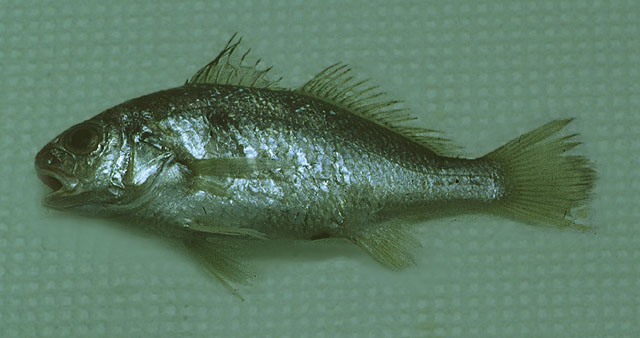| Sciaenidae (Drums or croakers) |
| 21 cm TL (male/unsexed); max.weight: 77.2 g |
|
demersal; marine; depth range 10 - 130 m |
| Western Atlantic: Nicaragua along the Caribbean coast and Atlantic coasts of South America to southern Brazil. |
|
Dorsal spines (total): 11-11; Dorsal soft rays (total): 21-24; Anal spines: 2-2; Anal soft rays: 7-8. Body silvery, grey on back and white on belly. Inside of opercle lining black, appearing as a dark triangular blotch externally. Base of pectoral fin and axil with a dark spot. Upper half of spinous dorsal fin dusky. Other fins pale. Mouth moderately large, slightly inferior. Tip of chin with a pointed flexible barbel. Gas bladder carrot-shaped, without appendages. Sagitta (large earstone) thick and ovoid, lapillus (small earstone) rudimentary (Ref 51721). |
| Inhabits coastal waters, usually over sandy mud bottoms (Ref. 3702). Feeds mainly on shrimps (Ref. 3702). Important food fish. |
|
Least Concern (LC); Date assessed: 08 October 2019 Ref. (130435)
|
| harmless |
|
Collected between 36.6 and 54.9 m depth during an exploratory fishing expedition in 1967; noted as occurring occasionally at this depth range (Ref. 26912). Also Ref. 5217, 13608. |
Source and more info: www.fishbase.org. For personal, classroom, and other internal use only. Not for publication.

